
Alphabetical Menu
Chronological Menu
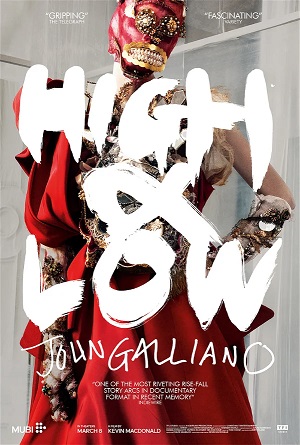
High & Low: John Galliano is an illuminating, heartfelt and warts-and-all documentary biopic about fashion designer John Galliano. Director Kevin Macdonald interviews Galliano himself as well as his colleagues and friends, including Anna Wintour, while combining the talk-head interviews with archival footage. He hooks the audience during the first few minutes by showing glimpses of Galliano during the lowest part of his career when he was accused of racist and antisemitic remarks before Galliano, in the present day, addresses the camera to look back at his past head-on. High & Low is lucky to have such a candid, charismatic and emotionally mature subject who's willing to be introspective. By humanizing him in a fair and balanced way, director Kevin MacDonald makes Galliano relatable to the audience. He treats the darker moments of Galliano's career with empathy and show different perspectives, i.e. some who believe that Galliano is truly remorseful for his anti-semetic/racist remarks while others, like one of the victims who's still hurt from the remarks, don't believe in the sincerity of his apology. Decide for yourself. High & Low: John Galliano doesn't ask you to judge Galliano nor does it judge him either. Galliano has clearly been through a lot emotionally and psychologically throughout his career, so kudos to the director for showing compassion toward him without putting him up on a pedestal. You don't have to be into fashion design to be engaged by this intimate, unflinching and insightful documentary. At 1 hour and 56 minutes, it opens at Quad Cinema via MUBI. 
Space: The Longest Goodbye is a mildly engaging and occasionally moving, but underwhelming and dull documentary about how NASA psychologists help astronauts cope with loneliness while on long missions in outer space. Director Ido Mizrahy uses a conventional approach to tackling the subject with a lot of talking-head interviews with a NASA psychologist, NASA astronauts like Cady Coleman, and their family members. The documentary's topic itself is fascinating and important, but the way that it's presented is rather pedestrian and academic without much emotional depth or very revealing insights. A separate documentary could've easily been made about NASA's use of an AI robot to interact with astronauts. Perhaps it would've helped to add more poignancy if director Ido Mizrahy were to get to know at least one of the astronauts more so that the audience could be more emotionally invested and relate to them. Most audiences probably won't know what it's really like to be so far away from loved ones in outer space. A truly great documentary finds the right balance between entertaining the audience and provoking them emotionally and intellectually. It also makes you forget that you're watching a documentary because there's enough of an engaging narrative within it. Space: The Longest Goodbye is well-edited, but doesn't achieve either of those essential feats that would allow it to transcend. At just 1 hour and 27 minutes, it opens at Quad Cinema via Greenwich Entertainment. It would be an interesting double feature with Spaceman. 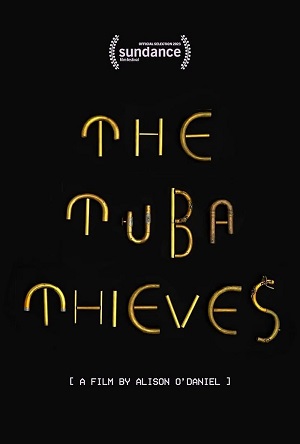
The Tuba Thieves is a bold, immersive and unconventional, but tedious documentary. The misleading title doesn't even begin to hint at how experimental the film is or what it's actually about. Director Alison O'Daniel takes the audience on a guided auditory journey from the perspectives of deaf and hard of hearing people. It's only ostensibly about the theft of tubas from LA high school between 2011 and 2013. O'Daniel doesn't include any interviews; just some descriptive texts. So, she demands a lot of patience, interpretation, and perceptiveness from the audience. By putting others in the shoes of deaf and hard of hearing, it makes for an immersive experience that transcends words. Don't expect to learn sign language while watching it, but you might learn how to sign a few words. Some of the film suffers from repetitiveness, though. The Tuba Thieves would be an interesting double feature with 32 Sounds, Samsara and The Tribe. At 1 hour and 32 minutes, it opens at BAM Rose Cinemas in Brooklyn, NY. 5lbs of Pressure 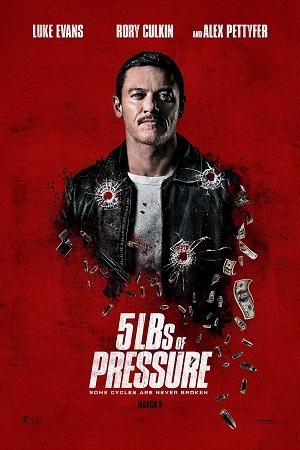 After serving 16 years in prison, Adam (Luke Evans) returns to his hometown where he hopes to reconnect with his son, Jimmy (Rudy Pankow), and his ex-girlfriend, Donna (Stephanie Leonadis). Eli (Zac Adams), the brother of the teen who Adam killed 16 years earlier, sets out for revenge. Meanwhile, Leff (Alex Pettyfer), struggles to make ends meet as a drug dealer with his nephew, Mike (Rory Culkin), and gets into trouble when he crosses paths with a local gangster. The screenplay by writer/director Phil Allocco adds nothing new, interesting or surprising to the crime thriller genre, although it deserves credit for being unflinchingly dark and gritty. At the beginning of the film, Adam has finished his parole and wants to make amends with his ex-girlfriend and son. His ex doesn't want to see him, though, and tries to stop their son from seeing him. Jimmy is a rebellious teen which means that he's willing to stand up to his mother to spend time with Adam. They shoot hoops together, but Jimmy doesn't know right away that he's his father; he finds that out from his mother. 5lbs of Pressure has enough dramatic tension to fill at least 3 movies. There's a lot going on all at which makes the plot more complex, but also exhausting and, at times, convoluted. Every time the film cuts back and forth between Adam's struggles and the parallel subplot involving Leff and Mike's struggles, it makes the plot feel overstuffed. It's too bad that Jimmy isn't the protagonist because a much more interesting character who's at a very vulnerable stage in his life. He needs better role models, but Adam doesn't seem like he even comes close to being a good one. Moreover, it's not quite clear how introspective and remorseful Adam truly is, so he remains a character who's at an emotional distance from the audience. There are some moments that aim for poignancy and tenderness, but, instead, they're maudlin and clunky. At least the dialogue doesn't try to be too hip and quotable like in Tarantino's films nor does it bombard the audience with profanity. However, it could use some comic relief. 5lbs of Pressure has a fine ensemble cast without anyone giving a wooden or hammy performance. They all try their best to rise above the shallow screenplay and, sometimes, they manage to rise above it ever so slightly. Rudy Pankow is the highlight, though, and sinks his teeth into his role with the most conviction. The cinematography and editing are decent without relying on shaky-cam or excessively stylish camera work. It's very violent and bloody at times, though, so this isn't a film for audiences who have a weak stomach. At 1 hour and 50 minutes, 5lbs of Pressure is a gritty and intense crime thriller, but uninspired, overstuffed and occasionally maudlin. It would make for an interesting double feature with Leon's Fantasy Cut.
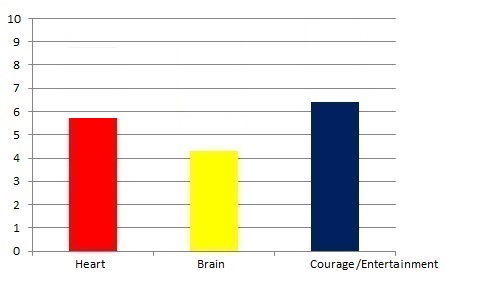 Accidental Texan 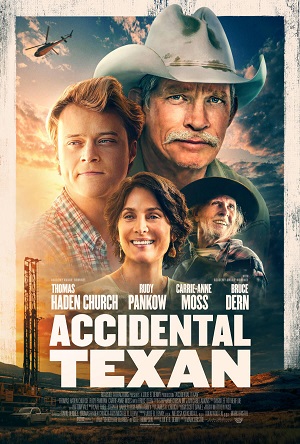 When Erwin (Rudy Pankow) drives back to LA from New Orleans after getting fired from his first acting gig, his car breaks down and he ends up stranded in a small Texas town. At a local diner run by Faye (Carrie-Anne Moss), he meets Merle Luskey (Thomas Haden Church), an oil driller, who offers to fix his car for free in exchange for a special request: to pretend to be an oil landman to delay the bank's forecloure on his oil rig. Merle hopes to find the right location to successfully drill for oil before it's too late.
The screenplay by Julie B. Denny, based on the novel Chocolate Lizards by Cole Thompson, clunkily blends comedy, drama and some thriller elements. Very few of the beats actually land as the screenplay tries to juggle too many tones with not nearly enough wit. Perhaps the issues stem from the source material because an actor pretending to be an oil landman isn't a very funny premise to begin with. At least the film doesn't veer into horror or bonkers territory after Erwin's car breaks down in the middle of rural Texas. However, it does becomes increasingly contrived and implausible. There's nothing inherently wrong with implausability as long as the laughs are there. The laughs, unfortunately, don't arrive when Merle confuses the legender football play Troy Aikman with Roy Aikman in a scene that falls flat. Erwin has a rocky relationship with his father, but that's one of the film's underdeveloped subplots. Merle happens to be grieving the death of his son, so he sees Erwin as a surrogate son. Then there's a history between Merle and Faye that's briefly mentioned. Every character seems like he or she is merely there as a plot device rather than a fully-fleshed human being. Even Scheermeyer (Bruce Dern), a cantankerous old man, happens to show up at the right time and at the right place because the plot requires him to. Perhaps it's easier to get inside the mind of these characters in the novel, but the film version fails to accomplish that important goal. Moreover, the third act is where the film goes off the rails as it escalates the thriller elements too high and heavy-handedly before resorting a schmaltzy, drawn-out ending that doesn't fully earn its uplift. Thomas Haden Church's warm and charismatic performance is the only thing that keeps Accidental Texan afloat. He and Rudy Pankow are undermined by the shallow screenplay while Carrie-Anne Moss and Bruce Dern are wasted in underwritten roles. They all deserve better material. The first act moves too quickly as Erwin barely spends any time inside the small town, so this isn't one of those films where the small town becomes a character in itself. Once he arrives at Merle's oil rig, the pace slows down before speeding up during an intense, violent, over-the-top scene in the third act. That scene almost turns the film into an unintentional parody. At a running time of 1 hour and 44 minutes, Accidental Texan is clunky, tonally uneven and bites of more than it could chew. In a double feature with There Will Be Blood, Accidental Texan would be the inferior B-movie.
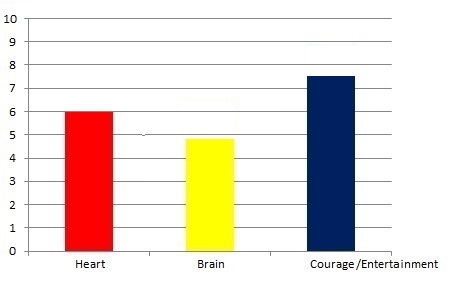 American Dreamer  Phil (Peter Dinklage), an economics professor, decides to pay $240,000 to live in a beautiful house with Astrid (Shirley MacLaine), a cranky elderly widow. His friend, Dell (Matt Dillon), isn't confident that he made the right decision. Astrid has a daughter, Maggie (Kimberly Quinn), who works as an attorney and makes it tough for him to own the house all to himself.
Screenwriter Theodore Melfi understands that comedy is often rooted in tragedy. Phil is a sad lonely, twice-divorced man who can't afford to buy million-dollar homes. He comes across as selfish and emotionally immature while lacking boundaries and common sense. Case-in-point: he sleeps with one of his graduate students. Does he not grasp the concept that his actions have consequences? He's not a teenager anymore. He also seduces Maggie somehow, but it's not quite clear what she sees in him. Is this supposed to be a screwball comedy? A character study? A satire perhaps? It doesn't work as either of those types of films. There's nothing funny about his flings or about the way that Astrid and Phil don't get along. Nor is it funny to watch Phil fall and hit his head in the bathroom. Is this supposed to be a slapstick comedy now? Every comedy should be at least somewhat grounded in realism, but very little in American Dream rings true. It's no help that Phil is often obnoxious and a bad role model who's hard to like or to root for. His character arc doesn't feel even remotely believable, so the third act fails to pack any kind of punch. Shirley MacLaine and Peter Dinklage try their best to rise above the bland and witless screenplay, but to no avail. They've all been in far better movies that handled the balance of comedy and drama more effectively, i.e. Peter Dinklage in The Station Agent and Shirley MacLaine in In Her Shoes. Both of those films are sweet, funny, tender and genuinely heartwarming while also being a better showcase for Dinklage and MacLaine's talents. The same can't be said about American Dreamer which is yet another dull, unfocused and undercooked comedy that's neither funny or witty enough.
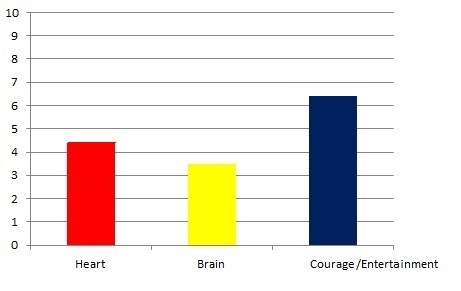 Cabrini 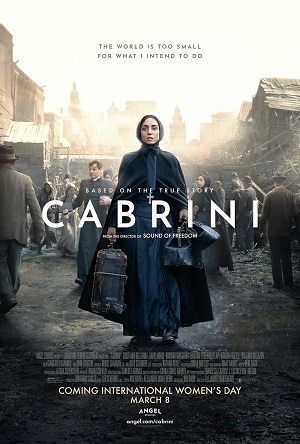 Francis Cabrini (Cristiana Dell’Anna), an Italian-American nun, yearns to help poor, sick and orphaned children with her missionary work around the world. Pope Leo XIII (Giancarlo Giannini) gives his permission to begin her mission in the slums of New York City. With very little money, she tries to open an orphanage there, but New York City's Archbishop Corrigan (David Morse) and Mayor Calloway (John Lithgow) stand in her way. Mother Cabrini comes across as a brave, persistent, determined, empathetic and kind woman who won't give up fulfilling her dreams no matter how many setbacks and obstacles she encounters. She's also intelligent, articulate and cunning without letting anyone treat her like a pushover, even when she crosses paths with powerful men like the Pope, the archbishop and the mayor. Her decency, which is a true, long lasting and intrinsic strength, makes her an underdog worth rooting for and also a great role model. A speech that she gives in the third act, her standing up to the mayor without being rude, and how she convinces a popular opera singer to help her are among the most powerful scenes. There are also some unflinchingly sad moments, like when someone dies, but the film doesn't dwell too much on those darker moments, so this isn't a very emotionally devastating biopic. To be fair, though, the screenplay by Rod Barr does suffer from on-the-nose dialogue and heavy-handedness. Barr often spoon-feeds the audience without trusting their emotions or intelligence enough and without leaving much room for interpretation. Those are minor, forgivable flaws, though, because Cabrini remains big-hearted and captivating from start to finish while avoiding dullness, melodrama and schmaltz. Cristiana Dell’Anna gives a genuinely heartfelt breakthrough performance that grounds the film in humanism, a truly special effect that's far more special than CGI. She radiates palpable warmth and charisma on screen. The always-reliable Giancarlo Giannini is very well-cast as the Pope. It's also worth mentioning the exquisite production design, cinematography and lighting which provide a stunning visual style that, in turn, becomes part of the film's substance. There are many haunting, poetic and breathtaking shots that speak louder than words. At a running time of 2 hours 20 minutes, Cabrini is a spellbinding, tender and empowering journey. It will make you stand up and cheer.
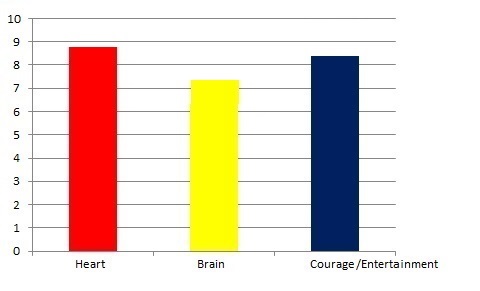 Glitter & Doom 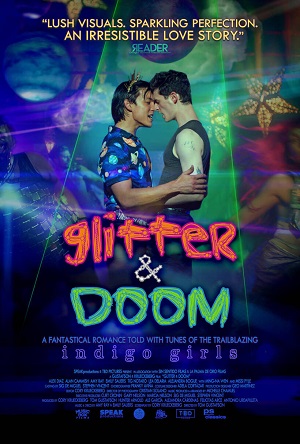 Glitter (Alex Diaz), a circus performer, falls in love with Doom (Alan Cammish), a singer-songwriter.
The screenplay by Cory Krueckeberg isn't very heavy on plot nor does it have anything new or profound to say about love, romance or dreams. Those are forgivable, though, because the film has plenty of charm thanks to the musical numbers with the music of the Indigo Girls. Sometimes a film can be elevated just by its lively music. The dramatic scenes are somewhat dull and not as interesting, i.e. when the plot briefly focuses on the relationship between Glitter and his mother, Ivy (Ming-Na Wen), or Doom and his mother, Robin (Missi Pyle). There are a few amusing scenes that provide some levity and comic-relief without leading to clunkiness. Glitter & Doom could use some more unflinchingly moving moments with Glitter and Doom, though. They both remain at a cold distance from the audience. The film relies too much on the music to tell the story without stopping enough to breathe life into these roles. Despite those setbacks, you'll still want Glitter and Doom to end up together. Fortunately, the ending, which won't be spoiled here isn't too sugar-coated, contrived or Hollywood. On a purely aesthetic level, Glitter & Doom is visually stunning with some dazzling musical numbers. Just when the film begins to become dull, the musical scenes invigorate it. The cinematography, lighting and editing are all superb and makes for a cinematic experience that's hard to describe---it has to be felt. Alex Diaz and Alan Cammish give heartfelt performances, so the film's emotional depth comes from them and from the music, not from the screenplay. That said, Glitter & Doom does overstay its welcome because it becomes a little exhausting around the 90 minute mark. At 1 hour and 55 minutes, it's an exhilarating, amusing and enchanting musical love story, but also overlong and somewhat shallow.
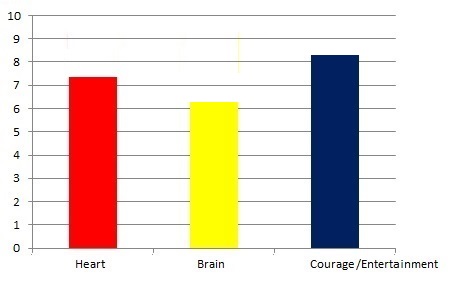 Imaginary 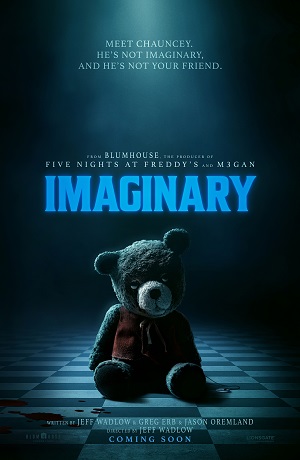 Jessica (DeWanda Wise), a children's book author, moves with her husband, Max (Tom Payne), and kids, Taylor (Taegen Burns) and Alive (Pyper Bruan), to her childhood home. Soon enough, Alice develops a friendship with Chauncey, a mysterious teddy bear that has a dark side.
The screenplay by writer/director Jeff Wadlow and his co-writers, Greg Erb and Jason Oremland takes too long to get to the meat of its story which turns out to be related to Jessica's childhood trauma and her relationship with her father. Even the first sign of something dark takes a while to arrive when Alice tries to injure herself because Chauncey told her to. If the plot were more lean and focused, it wouldn't suddenly veer toward comedy when Taylor invites Liam (Matthew Soto), a neighborhood teen, over and convinces her to pop a pill which he thinks is a hard drug but it turns out to be his mom's medication. There's some unintentional laughter when Chauncey spooks him under some towels in the bathroom. None of the beats land, unfortunately. Two other characters, Dr. Soto (Veronica Falcón), and Gloria (Betty Buckley), show up, but they're nothing more than plot devices who are only there to deliver exposition. Speaking of exposition, there's too little at first and then too much toward the end which makes it hard to follow what the film is really about and what Chauncey's motives are for that matter. It takes a steep nosedive during the surreal, creepy and bizarre third act that further blurs the line between fantasy and reality. Imaginary doesn't work as horror because it doesn't deliver enough scares nor does it work as a psychological thriller, so it's just as dull as last year's Cobweb. Imaginary only positive aspects are its slick and stylish production design, especially during a creepy sequence later in the film, and DeWanda Wise's strong performance. She resembles a younger Angela Bassett, and she's just as talented as her. If only she were to have better material than this lazy and shallow screenplay. There are pacing issues with the beginning moving too slow ,and then the ending feels rushed. Moreover, there are also too many jump scares, some of which can be easily predicted. Fortunately, though, the filmmakers don't rely on blood and guts to entertain the audience. There's surprisingly very little blood, and one major kill remains off-screen entirely with only a brief scream heard before a choppy edit to the next scene. At 1 hour and 44 minutes, Imaginary is a convoluted, tonally uneven and underwhelming pastiche of better horror films like Insidious, Pan's Labyrinth and Hereditary. 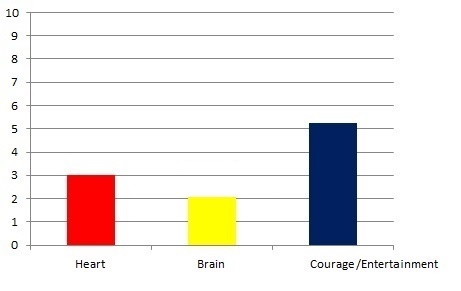 Kung Fu Panda 4 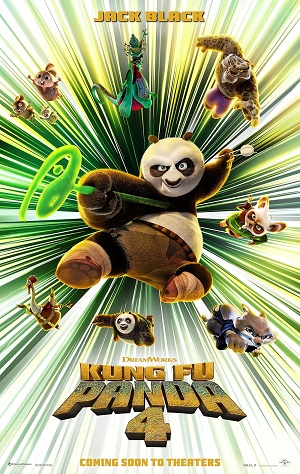 Po (voice of Jack Black) teams up with Zhen (voice of Awkwafina), a fox, to defeat a shape-shifting sorceress called the Chameleon (voice of Viola Davis). He also hopes he can prove that he's worthy of becoming the new spiritual leader of Peace Valley. Kung Fu Panda 4 is a harmless adventure, but it lacks to laughs, wit and thrills that make the first film a classic. The screenplay has three writers, namely, Jonathan Aibel, Glenn Berger, and Darren Lemke, none of whom manage to invigorate the film with the often bland dialogue. The plot is forgettable and not very exciting. There's also a twist in the second act that won't be spoiled here, but it's handled in a way that feels tacked-on as though the film were desperate to add a big surprise which isn't really that big after all. Chameleon makes for a boring villain who's very underwritten. Some of the humor lands albeit with any big laughs. The slapstick humor is amusing at first, but it quickly grows repetitive. Is it supposed to be funny when Po chews on Mahjong chips and ends up breaking a few teeth? That's among the many attempts at humor that don't quite land. Kung Fu Panda 4 loses steam early on and then coasts along with its lazy screenplay while merely going through the motions. If anything, it's a reminder that the Kung Fu Panda franchise has officially run out of any new and fresh ideas and has lost the magic of the beloved classic. The CGI animation is bright, dazzling and colorful enough to entertain children, but nothing exceptional. The pace moves along quickly, although not as fast as the pace in The Super Mario Bros.. When it comes to the voice acting, it's decent at best, although, to be fair, it's getting tiresome to watch Awkwafina doing the voice of yet another animated movie. At least her character isn't as annoying as the seagull in The Little Mermaid. At 1 hour and 34 minutes, Kung Fu Panda is mildly engaging with impressive CGI animation, but too low on laughs, thrills, wit and imagination.
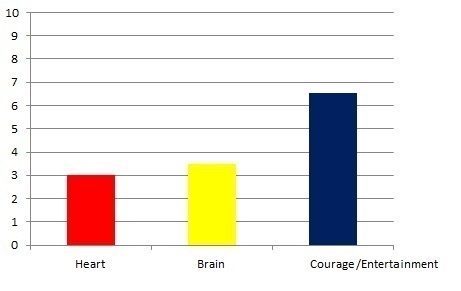 Love Lies Bleeding  Lou (Kristen Stewart) lives in a small town in New Mexico and manages a local gym which her estranged father, Lou Sr. (Ed Harris), owns. One night, Jackie (Katy O’Brian), a drifter from Oklahoma, arrives in town on her way to a bodybuilding competition in Las Vegas. She and Lou hit it off, but they get into trouble when Jackie takes matters into her own hands after JJ (Dave Franco) physically abuses his wife, Lou's sister, Beth (Jena Malone).
If you take Blood Simple and cross it with <Bound an Killer Joe, it would look something like Love Lies Bleeding. The screenplay by writer/director Rose Glass and co-writer Weronika Tofilska doesn't score points for originality, but it compensates for that as a taut and compelling crime thriller that's afraid to take risks and to get into dark territory. To say that Lou comes from a dysfunctional family would be an understatement. Her father is corrupt, domineering, violent, menacing and intimidating. Lou's sister, Beth, ended up marrying a man who's just as toxic as her father. When the audience first meets JJ, he's having sex with Jackie in his car. It's only a few minutes later that you'll learn that he's married to Beth and that Lou will fall in love with Jackie. Beth gets hospitalized when JJ beats her up. Did she try to fight back? Interestingly, the filmmakers choose to not show him beating her up or a scene that shows what caused him to beat her up, so the audience is expected to connect the dots on their own and to use their imagination, a powerful tool. There's a wonderful scene where Lou, Jackie, Beth and JJ are eating at a Chinese restaurant together while neither Jackie nor JJ talk about the elephant in the room: the fact that they had sex earlier. However, the audience can tell by the way that JJ behaves that he's very nervous. Elsewhere, though, Love Lies Bleeding very little to the imagination as Lou tries to help Jackie from covering up a crime that she commits. They also try to frame Lou Sr. for it. The plot gets increasingly complicated and twisted when Daisy (Anna Baryshnikov) claims to have witnessed their crime, so she blackmails Lou. The filmmakers should be commended for writing characters who are quite unlikable and deeply flawed, yet complex human beings. Lou and Jackie cross legal boundaries, but they have somewhat of a conscience. Whether or not they're introspective is a whole other matter. One of the film's most revealing and surprisingly tender scenes is when Lou sits down with Jackie when they first meet at the gym as they talk about their traumatic past. It's wonderful that beneath all of the grittiness, darkness and violence, Love Lies Bleeding actually has a beating heart. Kristen Stewart and Katy O’Brian give raw as well as emotionally resonating performances. They both have palpable chemistry together. Ed Harris is very-well cast as Lou's father who's also a sick and twisted crime boss. In terms of sex and violence, there's plenty of it, although not much nudity. The violent scenes are very graphic, though, and push the envelope with the unflinching gore. Other ways that the film tries to be shocking and disturbing include a scene where Lou Sr. devours a live beetle whole. Love Lies Bleeding also has some surprisingly surreal sequences which are darkly comedic. On top of that, the music score is superb along with the stylish cinematography and lighting. The film's visual style and use of music often become a part of its substance. At a running time of 1 hour and 44 minutes, Love Lies Bleeding is a sizzling, suspenseful, and electrifying crime thriller.
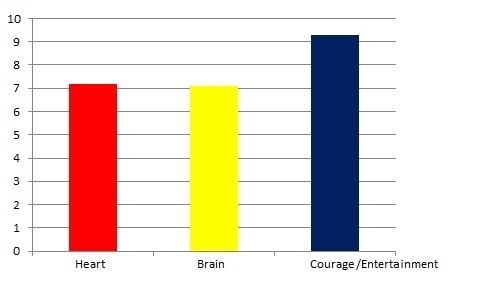 |